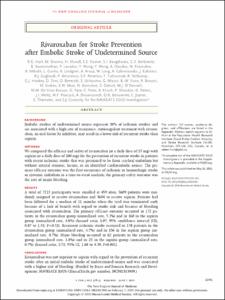Rivaroxaban for Stroke Prevention after Embolic Stroke of Undetermined Source
- Keimyung Author(s)
- Sohn, Sung Il
- Department
- Dept. of Neurology (신경과학)
- Journal Title
- New England Journal of Medicine
- Issued Date
- 2018
- Volume
- 378
- Issue
- 23
- Abstract
- BACKGROUND:
Embolic strokes of undetermined source represent 20% of ischemic strokes and are associated with a high rate of recurrence. Anticoagulant treatment with rivaroxaban, an oral factor Xa inhibitor, may result in a lower risk of recurrent stroke than aspirin.
METHODS:
We compared the efficacy and safety of rivaroxaban (at a daily dose of 15 mg) with aspirin (at a daily dose of 100 mg) for the prevention of recurrent stroke in patients with recent ischemic stroke that was presumed to be from cerebral embolism but without arterial stenosis, lacune, or an identified cardioembolic source. The primary efficacy outcome was the first recurrence of ischemic or hemorrhagic stroke or systemic embolism in a time-to-event analysis; the primary safety outcome was the rate of major bleeding.
RESULTS:
A total of 7213 participants were enrolled at 459 sites; 3609 patients were randomly assigned to receive rivaroxaban and 3604 to receive aspirin. Patients had been followed for a median of 11 months when the trial was terminated early because of a lack of benefit with regard to stroke risk and because of bleeding associated with rivaroxaban. The primary efficacy outcome occurred in 172 patients in the rivaroxaban group (annualized rate, 5.1%) and in 160 in the aspirin group (annualized rate, 4.8%) (hazard ratio, 1.07; 95% confidence interval [CI], 0.87 to 1.33; P=0.52). Recurrent ischemic stroke occurred in 158 patients in the rivaroxaban group (annualized rate, 4.7%) and in 156 in the aspirin group (annualized rate, 4.7%). Major bleeding occurred in 62 patients in the rivaroxaban group (annualized rate, 1.8%) and in 23 in the aspirin group (annualized rate, 0.7%) (hazard ratio, 2.72; 95% CI, 1.68 to 4.39; P<0.001).
CONCLUSIONS:
Rivaroxaban was not superior to aspirin with regard to the prevention of recurrent stroke after an initial embolic stroke of undetermined source and was associated with a higher risk of bleeding
- Keimyung Author(s)(Kor)
- 손성일
- Publisher
- School of Medicine (의과대학)
- Citation
- R.G. Hart et al. (2018). Rivaroxaban for Stroke Prevention after Embolic Stroke of Undetermined Source. New England Journal of Medicine, 378(23), 2191–2201. doi: 10.1056/NEJMoa1802686
- Type
- Article
- ISSN
- 0028-4793
- Appears in Collections:
- 1. School of Medicine (의과대학) > Dept. of Neurology (신경과학)
- 파일 목록
-
-
Download
 oak-2018-0969.pdf
기타 데이터 / 295.46 kB / Adobe PDF
oak-2018-0969.pdf
기타 데이터 / 295.46 kB / Adobe PDF
-
Items in Repository are protected by copyright, with all rights reserved, unless otherwise indicated.